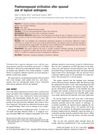 20 citations,
September 2015 in “Journal of The European Academy of Dermatology and Venereology”
20 citations,
September 2015 in “Journal of The European Academy of Dermatology and Venereology” Minoxidil foam promotes hair growth and reduces hair loss safely in men.
 20 citations,
April 2014 in “Dermatologic Therapy”
20 citations,
April 2014 in “Dermatologic Therapy” Sulfotransferase in hair follicles helps predict how well minoxidil works for female hair loss.
 20 citations,
January 2013 in “Annals of Dermatology”
20 citations,
January 2013 in “Annals of Dermatology” Topical minoxidil successfully treated temporal triangular alopecia.
 20 citations,
January 2012 in “International journal of trichology”
20 citations,
January 2012 in “International journal of trichology” Steroids are the best treatment for Alopecia Areata with few side effects.
 20 citations,
January 2009 in “International Journal of Dermatology”
20 citations,
January 2009 in “International Journal of Dermatology” Hair loss in Clouston's syndrome improved with minoxidil and tretinoin treatment.
 20 citations,
January 2007 in “Fertility and Sterility”
20 citations,
January 2007 in “Fertility and Sterility” A woman developed male traits from accidental contact with her husband's testosterone gel.
 20 citations,
March 1994 in “Clinical and Experimental Dermatology”
20 citations,
March 1994 in “Clinical and Experimental Dermatology” Too much topical minoxidil can cause excessive hair growth, but stopping treatment reverses it.
 20 citations,
March 1990 in “JAMA”
20 citations,
March 1990 in “JAMA” Topical eye β-blockers may cause hair loss.
 20 citations,
November 1987 in “Archives of Dermatology”
20 citations,
November 1987 in “Archives of Dermatology” The document concludes that topical minoxidil therapy is safe and effective in promoting hair growth for male pattern baldness.
 20 citations,
February 1985 in “Archives of Dermatology”
20 citations,
February 1985 in “Archives of Dermatology” Minoxidil helps hair regrowth, especially with more indeterminate hairs.
 19 citations,
November 2016 in “Dermatology and therapy”
19 citations,
November 2016 in “Dermatology and therapy” Stopping the medication infliximab and starting new treatments helped a woman's hair grow back and improved her scalp condition.
 19 citations,
January 2015 in “Skin Pharmacology and Physiology”
19 citations,
January 2015 in “Skin Pharmacology and Physiology” Minoxidil foam effectively promotes hair growth and reduces hair loss in men.
 19 citations,
September 2014 in “British Journal of Dermatology”
19 citations,
September 2014 in “British Journal of Dermatology” Minoxidil foam 5% effectively treats hair loss in both frontal and vertex scalp regions.
19 citations,
January 2012 in “Dermatology” Topical human epidermal growth factor may effectively treat acne caused by cancer medication.
 19 citations,
November 2011
19 citations,
November 2011 Using systemic drugs as creams for skin conditions shows promise, but more research is needed to confirm their effectiveness and safety.
 19 citations,
March 2011 in “Cutaneous and Ocular Toxicology”
19 citations,
March 2011 in “Cutaneous and Ocular Toxicology” Some chemicals absorbed through the skin can cause serious health problems.
 19 citations,
December 1985 in “Journal of The American Academy of Dermatology”
19 citations,
December 1985 in “Journal of The American Academy of Dermatology” Minoxidil can cause scalp comedones and acne.
18 citations,
December 2015 in “PubMed” Intralesional triamcinolone is more effective than topical betamethasone for treating localized alopecia areata.
 18 citations,
May 2015 in “Australasian Journal of Dermatology”
18 citations,
May 2015 in “Australasian Journal of Dermatology” Serenoa repens extract in topical products improves hair growth and appearance in male pattern baldness with mild side-effects.
18 citations,
November 2009 in “Archives of Dermatology” Calcipotriol doesn't prevent hypertrophic scars, but keratinocyte activation is important in scar formation.
 18 citations,
January 1998 in “Endocrine”
18 citations,
January 1998 in “Endocrine” RU58841, a nonsteroidal anti-androgen, showed potential as a topical treatment for hair loss, increasing hair density, thickness, and length without systemic side effects in Stumptailed Macaques.
 18 citations,
January 1997 in “British Journal of Dermatology”
18 citations,
January 1997 in “British Journal of Dermatology” 5% topical minoxidil can cause severe body hair growth, which disappears after stopping treatment.
 18 citations,
March 1984 in “BMJ”
18 citations,
March 1984 in “BMJ” Minoxidil helps hair regrowth in alopecia, but more research needed.
 17 citations,
January 2016 in “Dermatology research and practice”
17 citations,
January 2016 in “Dermatology research and practice” Emu oil may slow down skin healing but increases hair growth in burn wounds.
 17 citations,
March 1985 in “Journal of The American Academy of Dermatology”
17 citations,
March 1985 in “Journal of The American Academy of Dermatology” Minoxidil can lower blood pressure in some people.
17 citations,
January 1977 in “Dermatology” Ultraviolet light helped hair growth more effectively than triamcinolone acetonide.
16 citations,
October 2013 in “Anais Brasileiros de Dermatologia” Scalp condition healed with prednisone and tacrolimus.
 16 citations,
December 2008 in “Journal of The American Academy of Dermatology”
16 citations,
December 2008 in “Journal of The American Academy of Dermatology” Adults with atopic dermatitis showed similar adherence to different forms of hydrocortisone cream, but actual use varied despite self-reports of near-perfect usage.
 16 citations,
January 2007 in “JEADV. Journal of the European Academy of Dermatology and Venereology/Journal of the European Academy of Dermatology and Venereology”
16 citations,
January 2007 in “JEADV. Journal of the European Academy of Dermatology and Venereology/Journal of the European Academy of Dermatology and Venereology” A man had an allergic reaction to minoxidil, which stopped after he discontinued use and started corticosteroids.
16 citations,
May 2006 in “The Journal of Dermatology” Peeling skin syndrome was successfully treated with a vitamin D cream.
























